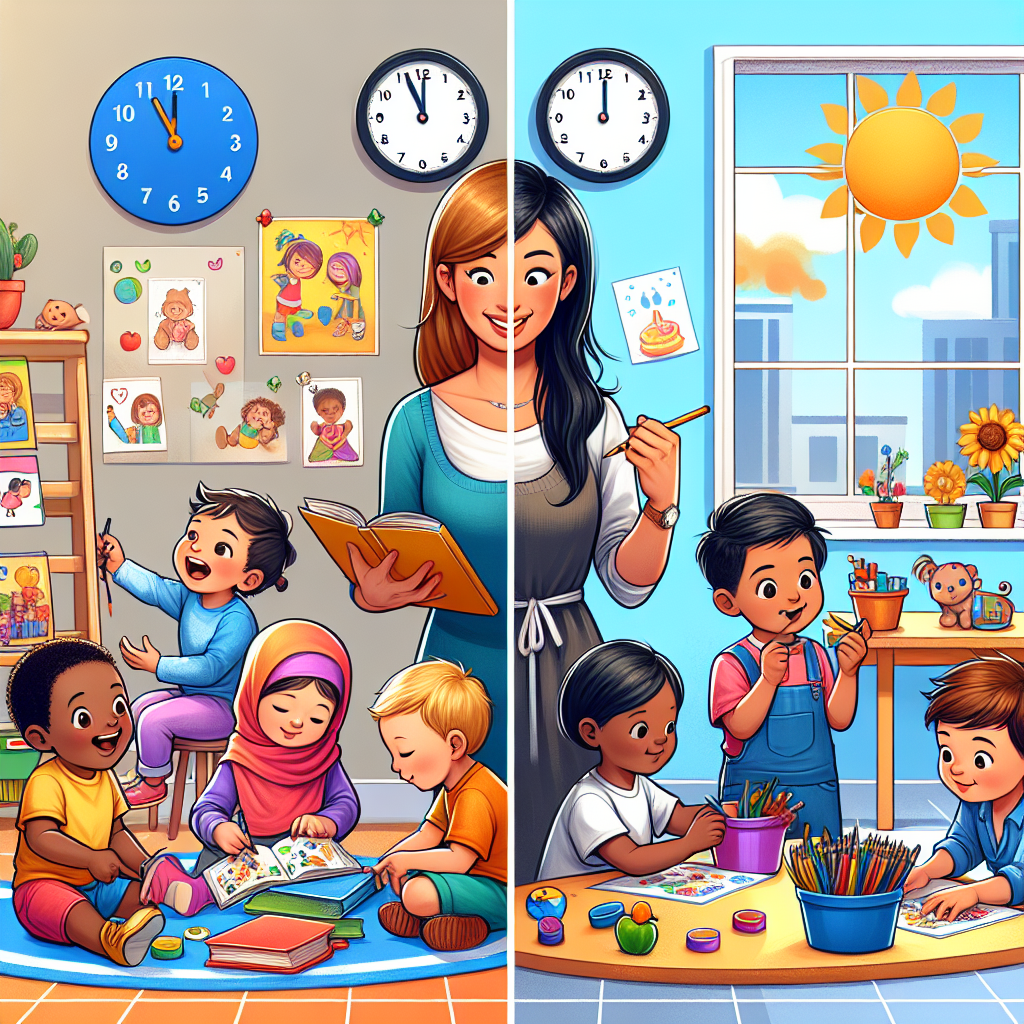The choice between half-day and full-day preschool programs is an important decision for parents. Both options have their own advantages and considerations that need to be taken into account. In this article, we will explore the differences between half-day and full-day preschool, helping parents make an informed choice for their child’s early education.
Benefits of Half Day Preschool Programs
Preschool education plays a crucial role in a child’s development, providing them with a solid foundation for future academic success. When it comes to choosing between half day and full day preschool programs, parents often find themselves faced with a difficult decision.
One of the primary advantages of half day preschool programs is the opportunity for children to have a more relaxed schedule. Young children have limited attention spans and can easily become overwhelmed by long periods of structured learning. By attending a half day program, children have the chance to engage in focused learning activities for a shorter duration, allowing them to maintain their enthusiasm and concentration.
Furthermore, half day preschool programs provide children with ample time for unstructured play and exploration. Play is an essential component of early childhood development, fostering creativity, problem-solving skills, and social interaction. In a half day program, children have the freedom to engage in imaginative play, explore their surroundings, and develop their motor skills through physical activities. This unstructured playtime is crucial for their overall development and helps them build a strong foundation for future learning.
Another benefit of half day preschool programs is the opportunity for parents to spend quality time with their children. In today’s fast-paced world, parents often find themselves juggling multiple responsibilities, leaving limited time for meaningful interactions with their children. By enrolling their child in a half day program, parents can have dedicated time to bond with their child, engage in activities together, and provide individualized attention. This quality time not only strengthens the parent-child relationship but also enhances the child’s emotional well-being and overall development.
Moreover, half day preschool programs can be more cost-effective for families. Full day programs often come with higher tuition fees, as they require additional resources and staff to accommodate longer hours. By choosing a half day program, parents can save on tuition costs while still providing their child with a high-quality early education experience. This financial flexibility can be particularly beneficial for families with limited resources or those who prefer to allocate their funds towards other educational or extracurricular activities.
Additionally, half day preschool programs can help children transition more smoothly into the formal education system. The shorter duration of these programs allows children to gradually adapt to a structured learning environment, preparing them for the longer school days they will encounter in kindergarten and beyond. By attending a half day program, children can develop essential skills such as following instructions, working in groups, and managing their time, which are crucial for their academic success.
In conclusion, half day preschool programs offer numerous benefits for children and their families. The relaxed schedule, ample time for unstructured play, quality parent-child interactions, cost-effectiveness, and smooth transition into formal education are all advantages that make half day programs a viable option for parents seeking a high-quality early education experience for their children. Ultimately, the decision between half day and full day preschool programs should be based on the unique needs and circumstances of each child and family.
Advantages of Full Day Preschool Programs
Full-day preschool programs offer extended learning opportunities, increased socialization, and enhanced academic preparation.
One of the primary advantages of full-day preschool programs is the extended learning opportunities they provide. In a full-day program, children have more time to engage in various activities and experiences that promote their cognitive, physical, and social development. They have more time to explore different subjects, such as math, science, and language arts, which helps them develop a broader knowledge base. Additionally, the longer duration of the program allows for more in-depth exploration of topics, fostering a deeper understanding of concepts.
Furthermore, full-day preschool programs offer increased socialization opportunities for children. Socialization is a crucial aspect of a child’s development, as it helps them learn how to interact with others, develop friendships, and navigate social situations. In a full-day program, children have more time to engage with their peers (minus Nap times and down times), participate in group activities, and practice important social skills. This extended socialization time (after nap times etc removed) allows children to develop stronger social bonds and build a sense of community within the preschool setting.
In terms of academic preparation, full-day preschool programs offer distinct advantages. The longer duration of the program allows for more instructional time, enabling teachers to cover a wider range of academic content. This additional time allows for more in-depth instruction and practice, which can lead to better academic outcomes. Research has shown that children who attend full-day preschool programs tend to have higher levels of school readiness, including better language and math skills, compared to their peers in half-day programs. The studies show that these advantages only last until the second grade.
Moreover, full-day preschool programs often provide a more structured and comprehensive curriculum. These programs typically have a well-defined schedule that includes a balance of academic instruction, playtime, and rest periods. This structured approach helps children develop important skills, such as time management and self-regulation. It also prepares them for the structured environment they will encounter in elementary school.
Another advantage of full-day preschool programs is the convenience they offer to working parents. Many parents work full-time and require childcare for the entire day. Full-day preschool programs provide a seamless transition from childcare to early education, allowing parents to have peace of mind knowing that their child is in a safe and nurturing environment. This convenience factor can significantly reduce the stress and logistical challenges faced by working parents.
In conclusion, full-day preschool programs offer several advantages over half-day programs. They provide extended learning opportunities, perhaps increased socialization, enhanced academic preparation, a structured curriculum, and convenience for working parents. These advantages contribute to a more comprehensive and well-rounded early education experience for children. When considering preschool options, it is important to weigh these advantages and choose the program that best meets the needs of the child and their family.
Factors to Consider When Choosing Between Half Day and Full Day Preschool
When it comes to choosing between half day and full day preschool, there are several factors that parents should consider. These factors can help determine which option is best suited for their child’s needs and development.
One important factor to consider is the child’s age and developmental stage. Younger children may benefit from a half day program, as they may not have the stamina or attention span for a full day of structured activities. On the other hand, older children who are more independent and have longer attention spans may thrive in a full day program.
Another factor to consider is the child’s social and emotional development. Some children may have separation anxiety or difficulty adjusting to new environments. In these cases, a half day program may be a better option, as it allows for a gradual transition and provides more time for the child to adjust. On the other hand, children who are more socially confident and enjoy being around others may benefit from the increased social interaction that a full day program provides.
The curriculum and educational goals of the preschool should also be taken into consideration. Some half day programs may focus more on play-based learning, while full day programs may have a more structured curriculum that includes academic subjects such as math and literacy. Parents should consider their child’s learning style and preferences when choosing between these options.
Another important factor to consider is the availability of before and after school care. If parents work full time or have other commitments, a full day program may be more convenient or necessary, as it eliminates the need for additional childcare arrangements. However, if parents have flexible schedules or can arrange for alternative care, a half day program may be a more suitable choice especially since the confidence and mental well being of the child is increased through parent/child interactions and quality time.
Financial considerations are also important when choosing between half day and full day preschool. Full day programs are typically more expensive than half day programs, as they require additional staff and resources. Parents should consider their budget and weigh the costs against the benefits of each option.
Lastly, parents should consider their own preferences and values when making this decision. Some parents may prioritize academic rigor and structured learning, while others may value a more relaxed and play-based approach. It is important for parents to choose a preschool that aligns with their own beliefs and values, as this will contribute to a positive and supportive learning environment for their child.
In conclusion, there are several factors to consider when choosing between half day and full day preschool. These factors include the child’s age and developmental stage, social and emotional development, curriculum and educational goals, availability of before and after school care, financial considerations, and parental preferences and values. By carefully considering these factors, parents can make an informed decision that best meets their child’s needs and sets them up for a successful and enjoyable preschool experience.
How Half Day Preschool Programs Support Parental Involvement
With shorter school hours, parents have more time to engage in activities that promote their child’s learning and development. They can participate in school events, volunteer in the classroom, and attend parent-teacher conferences without feeling overwhelmed by the demands of a full day program.
Research has shown that parental involvement is crucial for a child’s academic success. When parents are actively engaged in their child’s education, they can provide additional support and reinforcement at home. This can include helping with homework, reading together, and engaging in educational activities. By enrolling their child in a half day preschool program, parents have the opportunity to be more involved in their child’s learning journey.
Furthermore, half day preschool programs allow parents to have more quality time with their child. In today’s fast-paced society, many parents struggle to find a balance between work and family life. Full day preschool programs can add to this challenge, as children spend a significant portion of their day away from their parents. By choosing a half day program, parents can ensure that they have dedicated time to bond with their child and create lasting memories.
In addition to supporting parental involvement, half day preschool programs also promote a healthy work-life balance for parents. Many parents have demanding careers and find it difficult to juggle their professional responsibilities with their parental duties. By enrolling their child in a half day program, parents have the flexibility to schedule their work hours around their child’s school schedule. This allows them to be present for drop-off and pick-up, as well as participate in school activities without feeling overwhelmed.
Moreover, half day preschool programs can be more cost-effective for parents. Full day programs often come with higher tuition fees, as they require additional resources and staff to accommodate longer school hours. By choosing a half day program, parents can save on tuition costs while still providing their child with a quality early education.
In conclusion, half day preschool programs offer numerous benefits when it comes to supporting parental involvement. They allow parents to be actively engaged in their child’s education, provide more quality time for bonding, promote a healthy work-life balance, and can be more cost-effective. While full day programs may have their advantages, it is important for parents to consider their own needs and the level of involvement they desire in their child’s education. Ultimately, the decision between a half day and full day preschool program should be based on what best suits the needs of both the child and the parents.
The Impact of Half Day vs Full Day Preschool on Child Development
Socialization plays a crucial role in a child’s development, as it helps them learn how to interact with others and develop important social skills. In a full-day preschool program, children have more time to engage in social activities and interact with their peers. This extended period of socialization allows them to develop stronger relationships and learn how to navigate social situations effectively. On the other hand, in a half-day program, children have limited time for socialization, which may hinder their ability to develop these essential skills. Parents must weigh the actual time spent (minus nap times and downtimes between half vs full day). It may turn out that half day is actually more efficient and productive due to the removal of naptimes and downtimes.
Cognitive development is another important aspect of a child’s growth that is influenced by the duration of their preschool program. In a full-day program, children have more time to engage in various activities that promote cognitive development, such as problem-solving, critical thinking, and language development. The extended duration allows for a more comprehensive curriculum, which can enhance a child’s cognitive abilities. Conversely, in a half-day program, children may have limited time for these activities, potentially hindering their cognitive growth.
Emotional well-being is a critical factor to consider when deciding between a half-day or full-day preschool program. In a full-day program, children have more time to develop a sense of security and attachment with their teachers and peers. This extended period of interaction fosters a nurturing environment, which can positively impact a child’s emotional well-being. On the other hand, in a half-day program, children may have limited time to form these attachments, potentially leading to feelings of insecurity and anxiety.
Transitioning from preschool to kindergarten is a significant milestone in a child’s life. The duration of their preschool program can influence their readiness for this transition. In a full-day program, children have more time to develop the necessary skills and knowledge required for kindergarten. They have ample opportunities to practice routines, follow instructions, and engage in structured learning activities. This extended period of preparation can enhance a child’s readiness for the academic demands of kindergarten. Conversely, in a half-day program, children may have limited time for these preparations, potentially making the transition to kindergarten more challenging.
In conclusion, the duration of a preschool program, whether half-day or full-day, has a significant impact on a child’s development. A full-day program provides children with more time for socialization, cognitive development, and emotional well-being. It also enhances their readiness for the transition to kindergarten. On the other hand, a half-day program may limit a child’s opportunities for these developmental aspects. Therefore, parents should carefully consider these factors when making the decision between a half-day or full-day preschool program, ensuring that their child’s overall development is prioritized.
Conclusion
In conclusion, the choice between a half-day and full-day preschool program depends on various factors such as the child’s age, developmental needs, and family circumstances. While a half-day program may provide a more gradual transition for younger children and allow for more time spent with family, a full-day program can offer a more comprehensive curriculum and additional opportunities for socialization and learning. If both parents are working, then the choice for full day is simple. However, if one parent is available to care for the child, parents must weigh the benefits the child receives from being with a parent vs the potential hour or so of extra socialization. Most studies have shown that while full time preschool does give greater preparation for children to kindergarten, those advantages are leveled by the second grade. However, those children that have increased quality and engaging interactions with parents, while also benefitting from 1/2 days, carry the increased confidence and mental stability they gain. Those benefits are not shown to level out by the second grade. Basically, parents have to decide if their priority is their child’s mental health, confidence and building the trust of their parent/child relationship vs the increased familiarity of a child learning how to follow the rules and group dynamics of full day structured preschool. Ultimately, parents should consider their child’s individual needs and preferences when deciding between the two options. Lastly, children that have loving and trusting relationships with parents are shown to out perform and be far more successful than children that have reduced quality parental interactions. Parents should remember, that once mandatory school begins, the opportunities and time available to build that parent/child trusting relationship is drastically reduced.



